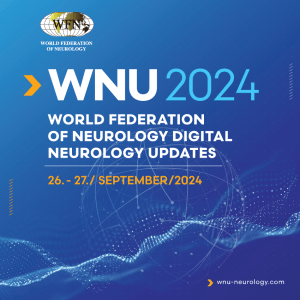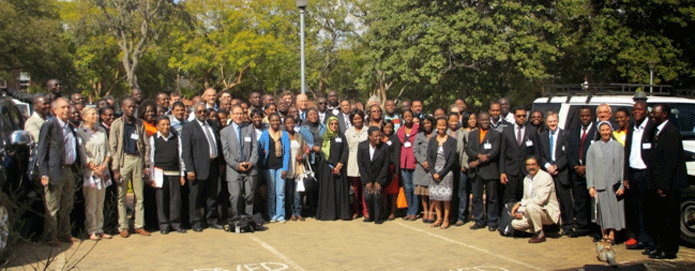
The 6th RTC took place in Zambia and was hosted by the University of Zambia in Lusaka. This three-day RTC had two main themes: infection and nervous system disorders (including stroke) and disorders of peripheral nerve and neuromuscular disease.
The RTC, organised by the European Academy of Neurology (EAN), was supported by a consortium of European and international scientific societies: University of Zambia, Zambian Ministry of Health, Epilepsy Association of Zambia, Pan African neuroscience Societies, American Academy of Neurology, International Brain Research Organisation, International PD and Movement Disorder Society, World Federation of Neurology, World Stroke Organisation. An unrestricted educational grant was also obtained from the Lundbeck International Neuroscience Foundation. Our gratitude goes to the local organising team led by Anthony Zimba and Masharip Atadzhanov. Their help was essential for the success of the RTC.
Thanks to the support of these societies, 26 young doctors and trainees coming from 17 Sub Saharan African (SSA) countries could be invited to the 6th RTC and were supported by a scholarship from the RTC fund. These individuals were selected by the course organisers from a larger number of neurological trainees who had been put forward by their Head of Department as potential course participants. Thus these selected participants represent some of the very best trainees from across Africa. Many doctors and trainees from the University of Lusaka as well as other medical training centres attended the course and the RTC counted 124 registered participants representing over 20 SSA countries.
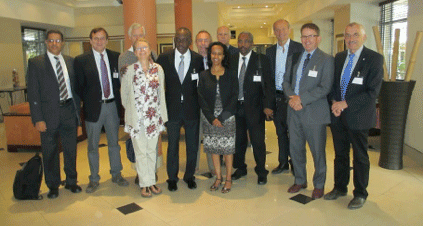
The core organisation of the course is led by the “Neurology and SSA” Task Force team at the EAN. The high international reputation for academic excellence of the course is underlined by the wide range of learned societies and institutions that support this annual course. The major regional significance of the course is underlined by the major Zambian institutions that supported it: the University of Zambia, The Zambian Ministry of Health and the Epilepsy Association of Zambia. The First Lady of Zambia, Dr Christine Kaseba-Sata, Goodwill Ambassadorto WHO, attended the opening ceremony of the course.
The format of the course was a mixture of lectures in the morning, supplemented by a case presentation fitting into the theme of the day by Elizabeth Sharon (Malawi), Folajimi Otubogun (Nigeria) and Patrice Mukomena (Zambia). The afternoons were taken up with small group interactive workshops to discuss cases brought by the experts; these sessions were intensive, but proved particularly popular with the participants (and enjoyable for the Faculty!).
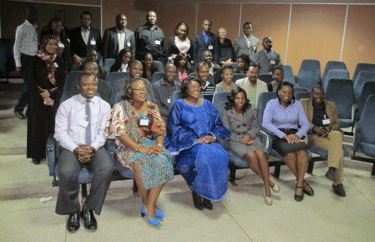
It was a real privilege to attend the course as a teacher and to learn from the clinical and scientific expertise of the faculty in the sessions and in the discussions. While the international faculty might bring some knowledge of recent scientific advances to the table, the regional faculty brought their extremely rich clinical experience and wisdom in how to apply that knowledge in the diverse health care systems of Africa. Likewise, the trainees brought a great many questions that arose from their daily practice; this unique opportunity for them to ask the Faculty questions and to network with their peers from across the continent was something they really valued. There was also a formal ‘Meet the Professor session’ supplemented by an informal ‘join the professor for lunch’ followed by ‘How to write a scientific paper.’
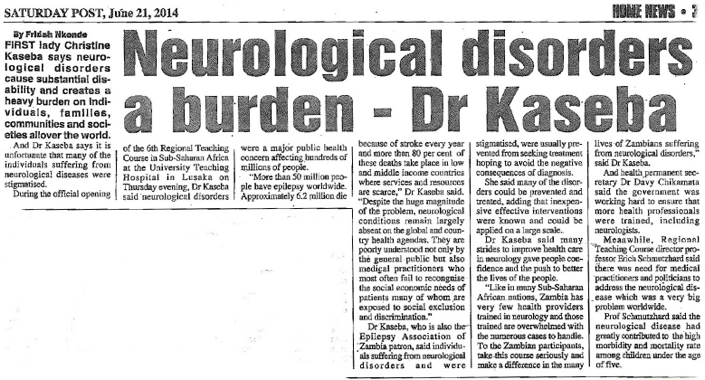
The meeting was organised to a very high standard, and clearly meets the need to build capacity in caring for people with neurological disorders in the African continent, where the burden of disease related to both communicable and non-communicable diseases of the nervous system is high.
To meet this continuing need, the EAN-led planning group met in Lusaka to plan the next course. The participants to the 6th RTC were asked to list up to three topics of interest they would like to see addressed in a future RTC. From the compilation of the topics received, two that had the highest request were identified for the 2015 RTC. This 7th RTC will be held in Khartoum, Sudan in October 2015 and the main themes will be Neuro-paediatrics and Stroke.
ACNR 2014: V14;I4
Published online 10/9/14

